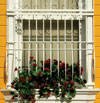The art of choosing good security barriersNovember 2009 We all know that visible security measures act as a deterrent to robbers, but what is a ‘good security barrier’ in a country where intruders are fool-proof, hardy and stop at nothing?
Faced with the reality that intruders are invading about 40 homes a day in South Africa, (according to the latest crime statistics), home barriers on all doors and windows must deter criminal interest to the point that the intruder knows it is just not an option to go further.
Below are some questions and advice from Trellidor to help you decide if your physical security barriers will do the job.
How do your barriers rate?
Check the condition of your existing security measures.
* Signs of wear and tear or weathering. * Old-style burglar guards screwed into rotting wooden frames. * Rusting screws in burglar guards. * Security gates that do not slide open and close easily. * Unsecured external doors. * Welded units that have loosened over the years. * Windows without any form of protection.
Take action
* Old, damaged burglar guards and gates that criminals can easily kick out or lever off will have to be replaced and new barriers installed on unsecured openings. * Get professional help in choosing the correct mix of barrier security products for your particular circumstances. * Make sure you secure every external doorway and window in your home. No window is too small or inaccessible for a determined thief. * Barriers are manufactured for different levels of security requirement, from low to high. The selection for each door, window or passageway will depend on factors such as location and accessibility.
Plan carefully
* Part of your security plan should be to close off an area where you can hide safely should your home be invaded by robbers. This could be the bedroom area, secured by a gate in the passageway and barriers on all windows. It could also be the bathroom, with sliding barriers on the windows to use as an escape route.
* If you already have security gates on external doors, ensure that you know where all the keys are. If you do not have a full set, ask yourself who has access to the missing keys and are they likely to be pressured into handing these over to robbers? If this is a matter for concern, rather get the locks changed than risk a violent break-in.
* A good tip for homeowners installing new barriers is to ask the supplier for a randomly allocated key for the security door used most by employees and the family, so only one lock has to be replaced if the key is lost or stolen. The rest of the sliding security units can be keyed alike and these keys kept in a safe place.
To give you an idea of what you will need, visit the Trellidor website and complete the online security assessment at www.trellidor.co.za/trellidor/risk_assessment.asp or ask a security consultant to do this for you. Similar Articles
Related News
|

